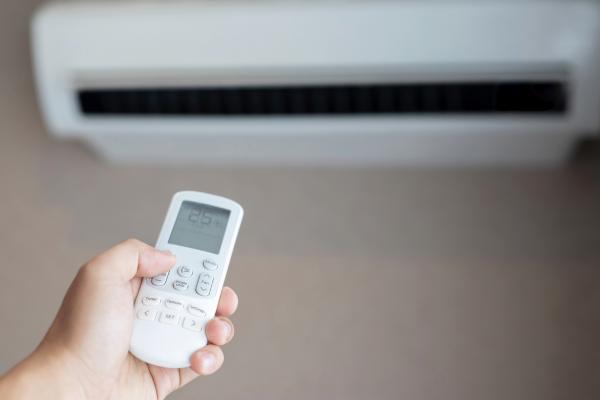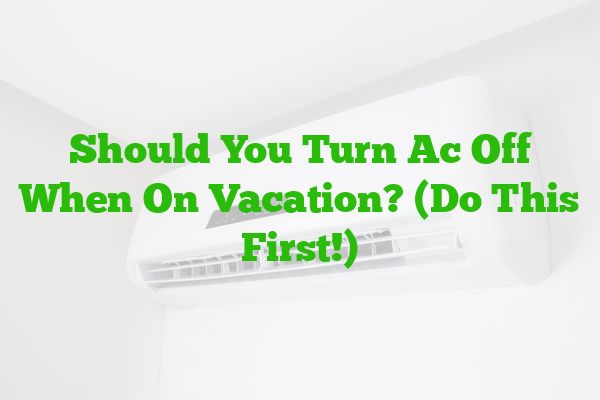With summer in full swing, many of us are looking forward to our well-deserved vacation. But before you jet off, you should consider the energy efficiency of your home while you’re away.
For those with air conditioning systems, the question arises: Should I turn my AC off when I’m on vacation?
Turning off your AC when on vacation can save you energy and money, but it can also lead to increased humidity and uncomfortable temperatures inside your home, which can cause damage to your belongings.
To prevent humidity buildup, you can leave windows slightly open and set up a dehumidifier if necessary or simply run the AC periodically or at a lower setting.
On one hand, turning your AC off while you’re away could save you money on your energy bill and reduce your carbon footprint. On the other hand, there may be reasons to keep it running.
The answer isn’t always clear cut — there are a few factors to take into consideration before making a decision.
In this article, we’ll explore why turning off your AC might or might not be the best option for conserving energy during your time away from home. We’ll also discuss other steps that can be taken to ensure maximum energy efficiency while you’re on vacation.
So whether you’re headed abroad or simply out of town for a weekend, read on to find out what’s best for both your wallet and the environment!
Pros and Cons of Turning your AC Off When On Vacation
Turning off your AC when on vacation can have both pros and cons, which are outlined below:
Pros:
- Energy savings: Turning off your AC while on vacation can result in significant energy savings. Running your AC non-stop can consume a lot of energy, and turning it off while you’re away can help reduce your energy bills.
- Lower maintenance costs: By turning off your AC while on vacation, you reduce the wear and tear on your system, which can help lower your maintenance costs over time.
- Extended lifespan: The less your AC runs, the longer it will last. Turning off your AC while on vacation can help extend its lifespan.
Cons:
- Increased humidity: Turning off your AC can result in increased humidity inside your home. This can lead to the growth of mold and mildew, which can cause health problems and damage to your home.
- Uncomfortable temperatures when you return: If you turn off your AC during the vacation it will take some time to cool down the house when you return. This can make it difficult to sleep or enjoy your initial time at home when you return from vacation.
- Risk of damage to belongings: High humidity levels can also damage your belongings, including electronics, furniture, and clothing. Basements are especially at risk due to the colder and more moist climate.
In summary, turning off your AC when on vacation can save you energy and money, but it can also lead to increased humidity and uncomfortable temperatures inside your home. If you decide to turn off your AC, it’s important to take steps to prevent humidity buildup, such as sealing windows and doors, and setting up a dehumidifier if necessary.
Benefits Of Turning Off your Ac
Turning off your AC during a vacation is a great way to save energy and money. It can reduce cooling costs significantly, making vacations more efficient and cost-effective.

Turning off the AC while you’re away also offers environmental benefits. By decreasing the amount of energy being used, you’re helping contribute to a healthier planet.
With these AC-savings, vacation-power and vacation-efficiency are maximized while reducing carbon emissions.
When deciding whether or not to turn off your AC on vacation, it’s important to consider the risks involved.
Risks Of Keeping Ac On
Leaving your air conditioner running while away on vacation may seem like a good idea, but it comes with some risks. Running your AC while away from home can lead to higher energy bills and the potential for an equipment malfunction in your absence.
If you’re leaving your home for an extended period of time, turning off the AC is a better option for saving money and avoiding costly repairs.
Vacation home AC safety is also important to consider when leaving your air conditioner on during vacation. An AC that runs constantly without interruption can overheat and cause damage to components or lead to fires in extreme cases.
Additionally, if you have pets staying at home while you’re away, they could be affected by having the air conditioning on all the time if they’re too close to vents or sensitive to temperature changes.
It’s best to take a few extra steps when leaving your house unattended with the AC running. Make sure to turn off all electronics and appliances not in use, keep windows closed, and check filters regularly before taking off.
Taking these precautions will help reduce energy costs and prevent any unexpected problems while you’re away from home.
When it comes to saving energy while on vacation, there are still many options available that don’t involve keeping the AC running continuously. From utilizing fans instead of relying solely on your air conditioner to setting timers around peak usage hours, discovering new ways to conserve energy can help lower electricity bills and make sure that everyone stays comfortable in the heat of summer without compromising safety or efficiency.
Energy-Saving Tips For Vacation
When going on vacation, it’s important to think about energy-saving tips that can help you conserve energy. One of the best ways to save energy is to turn off the air conditioner (AC) when you leave for your trip.
This will not only save money but also prevent any potential damage from occurring while you’re away.
When doing this, you’ll want to make sure that you set the thermostat in an ‘away mode’ setting or turn it off completely. This will prevent any unnecessary energy being used while you’re gone.
If you’re concerned about humidity levels, consider setting the thermostat a few degrees higher than normal and running a dehumidifier instead of running the AC. This will help reduce humidity levels while saving energy at the same time.
These energy-saving vacation tips can help keep your home comfortable and save money while you’re away. Now that we’ve looked at conserving energy through AC settings, let’s explore some alternative cooling options.
Alternative Cooling Options
If you’re looking for an alternative to turning off your AC while on vacation, there are several options that you can consider. One of these is a portable air conditioner.
These are great for when you want a little extra cooling and don’t want the hassle of installing traditional AC units. They’re also energy efficient and fairly inexpensive to operate.
Another option is an evaporative cooler, which uses water to cool the air in your home naturally. This type of cooler requires no electricity, only water to operate, making it a great choice for those looking for an energy-efficient cooling solution.
Additionally, window fans and ceiling fans can be used to help circulate the air throughout your home and keep it feeling fresh and cool. Finally, if humidity is an issue, then an air cooler may be the best choice as it pulls moisture from the air and helps create a comfortable environment.
Each of these alternatives provides a viable option when it comes to keeping cool while on vacation without having to turn off your AC unit.
Conclusion
As a freelancer, I know how important it is to save energy and money. That’s why when I go on vacation, I always make sure to turn off my air conditioner.
Turning off the AC can provide multiple benefits, like keeping your utility bills low and reducing wear-and-tear on the system. It also prevents energy waste while you’re away from home.
However, there are risks associated with turning off the AC, such as pests or mold buildup in your home. To mitigate these risks, consider investing in air filters or dehumidifiers.
This will help keep your home fresh and clean even when you’re away for an extended period of time.
Finally, if you don’t want to turn off your AC completely, try some energy-saving strategies like setting the thermostat higher than normal or using fans instead of air conditioning. You can also look into alternative cooling solutions like evaporative coolers or portable air conditioners that use less energy than traditional systems.
Taking these steps will help keep your energy costs down while still providing comfortable temperatures in your home during vacation time.




